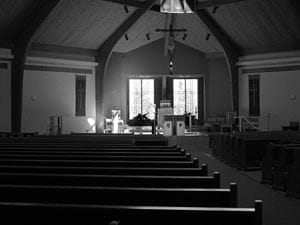
In the film Bridget Jones, Bridget is having dinner with some pretentious married people. One of them says to her, "Bridget, why do you think there are so many people over thirty and single these days?" Bridget looks her straight in the face and says, "Well, I guess it doesn't hurt that we have scales under our clothes."
We singles (especially those over the age of 30 or divorced) often feel like we have scales under our clothes in our churches. Not a gross disfigurement that makes everyone stare. Not an outward, in your face prejudice that is thrown at us. But something more subtle. Something that makes us feel like even though we look pretty normal on the outside, there is quite possibly something wrong with us underneath the surface.
According to an article in the New Yorker, there were four million adults living alone in this country in 1950. Now there are thirty-one million, almost eight times as many. More than half of adults in the United States are single at this point in time.
We could safely say that there are also a large number of singles in our churches. And yet, this large demographic can often be unintentionally overlooked.
I want to be careful with this article because I don't want to point fingers at anyone or sound cynical. I love my married friends, I love my pastors, and I don't think they have ever meant to hurt us. I don't think they have ever meant to leave us out.
But there are times when many singles have felt left out in our churches without anyone meaning for that to happen.
There are funny ways that church culture reflects their unawareness of the challenges that singles face—not in what they do give us, but in what they don't give us. The sermons that aren't given, the prayers that aren't offered, the books that aren't written. As if what we are going through is not that important.
I remember going to a church service where a pastor tearfully prayed for people in different predicaments: "Lord, I pray for the married people who are struggling through the difficulties of relationship right now. For the divorced people who are wrestling with rejection. And for the single people who (cue a bit of chuckling) don't know how good they have it."
This was really hard for me to hear because being a Christian single into my 40s has been one of the most difficult journeys of my life. When the pastor said that, I didn't feel like my struggles were validated.
I know he didn't mean to hurt me. He just didn't really understand me because he hadn't been through the same thing.
I know our pastors and married friends want singles to feel loved and accepted. So let's look at a few ways they can do that.
Acknowledge that a single person's struggles are valid.
Many singles struggle through something called disenfranchised grief. To disenfranchise means to deprive a right from someone. So disenfranchised grief means depriving someone's right to grieve.
Instead of mourning over something that happened, disenfranchised grief involves mourning over something that has never happened. Some of us never lost a baby, but that's because we never had a child. Some of us have never lost a spouse, but we never had one in the first place. Others might have gotten a divorce, and the dream of what they hoped for was shattered.
In all these cases, we lost what we had envisioned for our life. But since that dream was never concrete, it isn't seen as a loss.
We often hide our pain because we don't think we are supposed to have it, and then people are unaware that there is such a deep grieving going on. They don't understand how much we need this grieving to be addressed.
The loss of something that did exist and the mourning over something that never existed are both very, very difficult. Unintentionally and silently, we are told there is no reason to grieve our singleness.
How can our married friends and churches help us when we are going through a season of struggling over our singleness? It's really simple: Acknowledge that it is a real loss. Validate that what we are going through must be really difficult at times.
Recognize that your experience with singleness might be very different from our experience with singleness.
Many people that married young remember their singleness with a lot of fondness. "All those fun dates! All that freedom!" They don't often realize that once you hit 30 and are waiting five, ten, fifteen years or more, it is a whole different story. For us, there is often a long history of dating that has always ended in heartbreak. Freedom is there in abundance, but only because we don't have a family. Most of us would trade in our freedom for a healthy family in a heartbeat.
I have lived a very full life as a single woman. I have traveled all over the world for twenty years sharing music and speaking. There are so many things I appreciate about my singleness.
But the beauty has come with a lot of heartache as well. I am very grateful for what God has given me as a single woman, but that doesn't mean there has been a lot of struggle alongside the gratefulness. God has taught me to long and let go at the same time.
Married people that are discontent can sometimes project this onto the advice they give their single friends, saying things like "Being married is so hard!" On one hand, it is good for singles to have a realistic view of what their lives would be like if they got married. On the other hand, we don't often feel listened to when this is the kind of advice we are given.
A good rule of thumb is to come up with a few questions that would make singles feel heard. Questions like "what has it been like for you to be single?" Or "how can I pray for you in your singleness?" And then listen, really listen to the answer that a single person gives.
Listening and loving look so much alike that you can barely tell them apart.
Allow singles to speak into your lives and realize that they have a lot of wisdom, too.
As I stated earlier, there are not a lot of sermons or books that are on the topic of singleness, especially preached or written by single people. This makes sense because most of the people writing the books and the people giving the sermons aren't single. The problems singles face is far from these leaders' minds because it's been such a long time since they have been single themselves.
When you think about this, it begs the question, "Why aren't there more influencers in the church who are single?" I recently read an article in The New York Times in which a single pastor named Mark Almlie was interviewed about how hard it is for him to find a job. He had applied to 500 jobs to no avail. "I'll get an e-mail saying 'wonderful résumé. Once I say I'm single, never married, I never hear back."
In all of my fifteen or so years of working in the church, I have heard of two senior pastors that were single. This can easily send us a message that says, "your voice is not as important if you don't have a family. You don't have enough wisdom to speak to the rest of us if you aren't married."
Ironically, Jesus was single. Paul, one of the greatest founders of our faith, was also single. For centuries, the leaders of the Catholic Church were single because people saw them as having more time to devote themselves to God.
For some reason, that has shifted for Protestants. It seems an unsaid rule that leaders need to be married, that singles don't have as much wisdom about life because of their relationship status.
A single person's experiences are different, but they still have a lot of wisdom to give. To correct this way of thinking, simply look for singles in your life and remind yourself that they have a lot to bring to the table. Allow them to lead and teach and speak into your life.
Invite them in.
In many of my single years, I would maybe have 1-3 meals a week in which I was sitting across from another human being talking. That's about 18 meals a week without anyone to talk to as I ate. I dredged through these meals because it was so hard for me, and it didn't feel natural.
God himself said in Genesis that it is not good for people to be alone. Perhaps in your busyness with family life, you have never noticed the singles in your lives that eat so few meals with other people. Maybe you don't notice that they have no one to sit with at church.
If you made it a point to find us at church and let us know that we have a place to sit, that would mean the world to us. If you had us over to your house for reasons other than to babysit your kids, we would be so grateful. And actually, some single people like me love to cook and would love to have you over some time as well.
Inviting us in, allowing beautiful conversations to happen, taking the initiative to welcome us into family gatherings, all of these things would bring so much light and joy into the life of a single person.
Let's remember that even though our life paths have been very different, we are all a part of the same human family.
The heart of a church is not a building or programs, but the family that forms inside of those four walls. For those of us that don't have a traditional family, this may be the only family we have on this earth.
Let's welcome singles into that beautiful, vibrant, diverse family we call our church.

